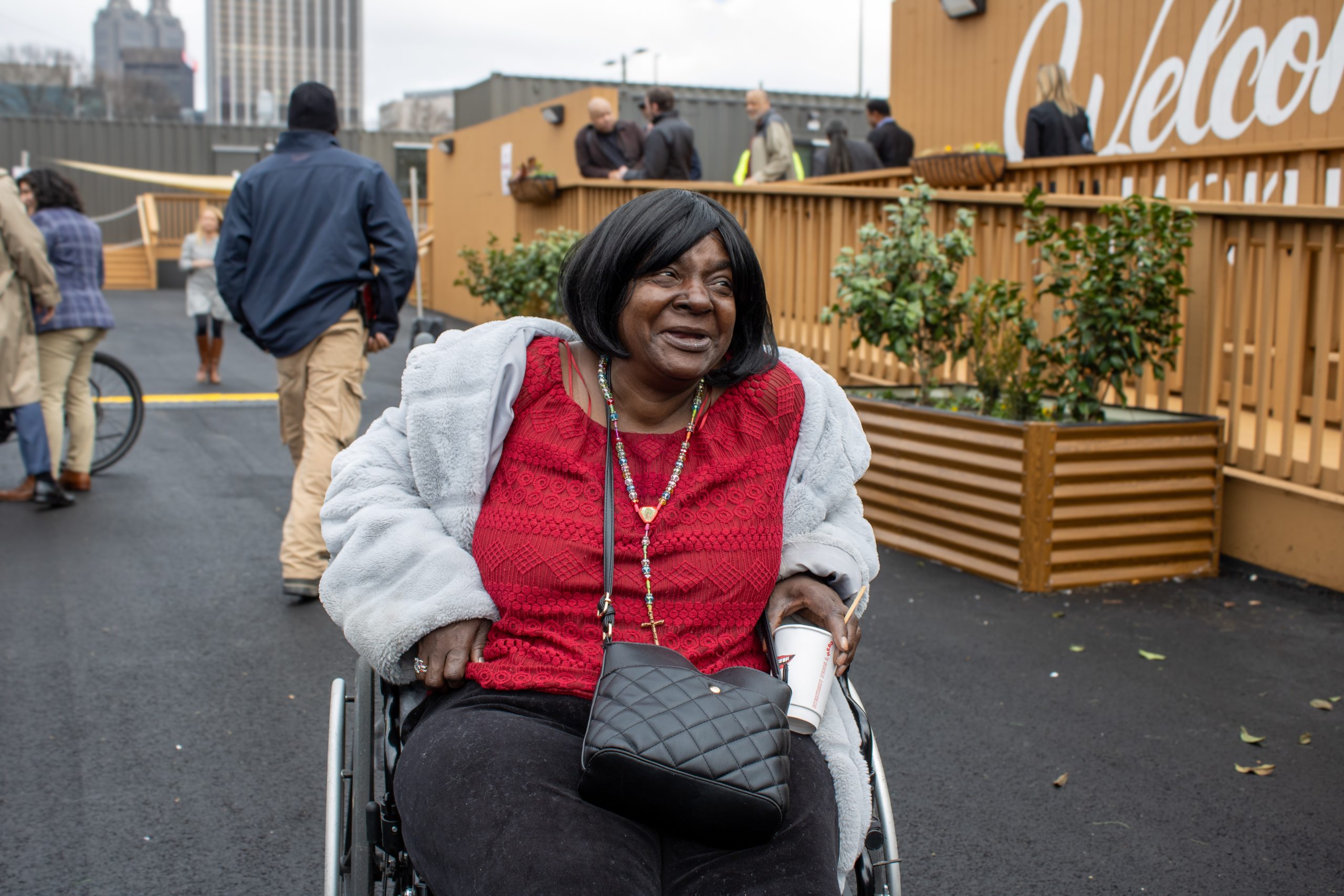Almost a month after moving into the city of Atlanta’s first cargo container village, Wanda Sutton still hasn’t fully acclimated to life under a real roof.
She’d spent some three years taking shelter beneath a bridge near the Georgia State University MARTA station, and she sometimes wakes up these days surprised to be warm under the covers in a real bed, protected by four sturdy walls and a door that locks.
“Am I really in my own place?” she’ll ask herself. “It’s unbelievable in a way.”
It’s not lost on Sutton just how lucky she is to have gained residency at The Melody. The city debuted the 40-unit shipping container apartment complex, located at 184 Forsyth St. SW in downtown Atlanta, at the beginning of February to rapidly rehouse people living on the street. The rent at Sutton’s new one-bedroom container home is free for her, defrayed by the city and, likely soon, by Atlanta Housing vouchers.
But she worries for the hundreds of other Atlantans locked out of a prohibitively expensive housing market, who must continue to weather the elements to survive.
“No human should have to sleep in the cold,” Sutton said.
As Georgia State University sociology professor Deirdre Oakley put it, “The city of Atlanta is no longer affordable,” especially for people on the lowest rungs of the income ladder.
Oakley, a housing expert, said the city’s new “rapid housing” program is part of an important push to place people experiencing homelessness in safe, stable, and affordable apartments — but it’s also a stopgap measure to facilitate the city’s effort to get rid of tent cities.
LEARN MORE ABOUT THE MELODY
Can Atlanta’s foray into cargo container housing deliver 500 units for unhoused people?
Replicating this innovative affordable housing model is much easier said than done.
Clearing out encampments
Atlanta Mayor Andre Dickens’ office is preparing to sweep out a number of encampments under intown bridges — like the one where Sutton once lived — and it recently announced a plan to use part of the Old Fourth Ward’s now-vacant Atlanta Medical Center site for temporary housing for unhoused people, according to the Atlanta Journal-Constitution.
“It’s always good to put people into homes, especially housing that’s better than encampments,” Oakley said, but she’s concerned that by displacing people from the places they’ve made home, these initiatives could also dismantle the sense of community they have established — upending the support systems that lend hope to Atlantans down on their luck.
“We might assume, as housed people, that unhoused people don’t have community. That’s completely false,” Oakley said.
Sutton concurred, saying she made plenty of friends while homeless. She’s befriended fellow Melody residents, too, she added, sitting around the fire pits scattered between buildings.
Even though such municipal efforts can provide people with much better living conditions, many people experiencing homelessness will still be left behind, Oakley added.
“If the mindset is, this is better than under a bridge, you can forget about community,” she said. “And what about the people who don’t get in?”
The Dickens administration aims to deliver 500 “rapid rehousing” shipping container apartments for single residents by the end of 2025, but housing experts aren’t convinced that’s realistic, since NIMBYism – the “not in my backyard” mindset common in residential neighborhoods – poses considerable hurdles.
“People don’t know what it means to be homeless,” Sutton said. “They think homeless people are crazy. They don’t feel safe around homeless people.”
What’s more, the city’s plan to uproot people whose best residential option is finding shelter under highway bridges has exacerbated many unhoused people’s belief that the city is criminalizing homelessness.
“Homeless people are treated like criminals,” Sutton said. “[Police] would come and kick people’s beds and tents [when evicting them from public properties]. They don’t understand the fact that we don’t have nowhere to go. They don’t have no compassion.”
The city’s rapid rehousing plan
Misconceptions about people experiencing homelessness have proliferated in a way that’s complicating Atlanta’s efforts to provide housing for them.
Joshua Humphries, Dickens’ top housing advisor, said the city has identified at least two publicly owned properties that could be used to expand the rapid housing program — but he knows getting community members’ approval will prove challenging.
“We’re in the early stages of site planning,” Humphries said of a city-owned property neighboring the new Westside Reservoir Park on Northside Drive. The community engagement process should kick off in a month or so, he said.
Humphries acknowledged that neighbors have already raised complaints about the city’s plan to develop a rapid housing complex in Mechanicsville.
The city will have to tread carefully as it builds out the rapid housing initiative, said Alison Johnson, the head of the local nonprofit Housing Justice League.
“This administration must be extremely thoughtful of where these container homes will be located,” she said. “They cannot all be concentrated in communities that are staving off gentrification or those communities making progress to sustain their legacy residents.”
Johnson suggested finding vacant city-owned properties in more affluent neighborhoods like Buckhead, Morningside, Midtown, Old Fourth Ward, Cascade Heights, and Adamsville.
No matter where the city develops its next shipping container complex for unhoused people, demand will be high, said Sutton: “One tragedy, and you can become homeless.”
A little over three years ago, she was comfortably housed in a studio apartment in town. Only when her landlord hiked the rent beyond her means did she find herself facing the same housing challenges as so many other low-income Atlantans.
“It was scary,” she said. “I didn’t know what would happen. I didn’t think this would be a long-term situation.”



Can y’all look into the status of the Manley House on the Atlanta Medical Center campus? I think it’s sitting empty. Could house at least a dozen people